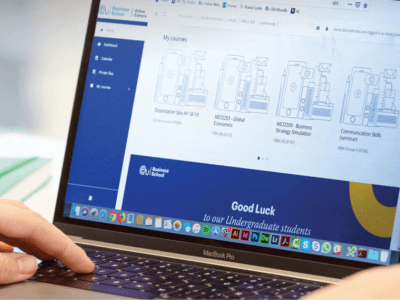Improve Your Emotional Intelligence
You’re undoubtedly smart, but that doesn’t mean you’re emotionally intelligent. Emotional intelligence describes both the awareness of emotions and the ability to manage them.
Why is emotional intelligence important? Well, the soft skills that it implies are extremely in-demand in the workplace. Employers look for it, knowing that it makes you a better colleague and leader. This isn’t just about your career, though; the cultivation of emotional intelligence can bring benefits to every facet of your life.
Here are 9 steps to improving emotional intelligence.
1. Develop emotional awareness.
Study your emotions and become familiar with your own emotional patterns. Throughout a single day, we experience a number of feelings without necessarily registering them. Try to pay closer attention to what triggers each feeling and how you experience it in your body. Remember, the emotional spectrum is much more complex than happy and sad.
It’s also possible to feel more than one emotion at a time. Maybe you’re proud of a friend for achieving a promotion but simultaneously hurt that they didn’t tell you they applied for it. That’s normal, and naming those feelings might make them easier to deal with.
2. Respond, don’t react.
Once you’ve gained a deeper understanding of your emotions, you’re equipped to make positive changes to your habitual reactions. For example, before you acknowledged that you were feeling resentment towards your colleague, you may not have realized that this feeling was driving your actions, affecting your behavior towards them.
By pausing and noting your emotions before you act, you can respond from a place of greater awareness. The next time you begin to experience a strong emotion in your body, take a moment to decide how you’d like to respond instead of simply reacting from the feeling.
3. Reflect on your behavior.
We’re all imperfect human beings, meaning we won’t always get it right. What really matters, then, is how you handle it when you inevitably get it wrong. Instead of denying your mistake (to yourself or to others) or moving on quickly to avoid reality, try to learn from these difficult moments.
A good question to ask yourself is “what can this teach me?” Maybe you sent a rude email because you were hungry and irritable. The lesson from this could be to look after yourself better during the workday or even to wait ten minutes before responding to a sensitive email.
4. Work on your confidence.
Insecurity brings out the worst in all of us. It can make us needy and nervous, and it can drive us to overcompensate for our feelings by bragging and acting arrogantly. It’s important to build genuine confidence, which is a very different thing from showiness and self-importance.
One way to build confidence is to keep promises to yourself. You’ll soon learn from experience that you can depend on you. Another is to notice what makes you unique and lean into it. Find ways to celebrate your individuality!
5. Become an active listener.
To form genuine connections with others, you have to learn to really listen. Listening is an underrated skill! Be honest; do you hear the people in your life? Or do you get distracted as they talk, waiting for your turn to speak? Maybe you even scroll your cellphone during conversations. You’re likely to miss out on crucial information.
Don’t worry! Active listening can be relearned through practice. First, ensure that you maintain eye contact with anyone that speaks to you. Try affirming people as they talk using short phrases like “I see.” You may also paraphrase what people tell you to confirm your understanding.
6. Cultivate a positive mindset.
Some people groan when they hear the words “positive mindset.” Ironically, it now has negative connotations, largely due to a recent backlash against what’s referred to as “toxic positivity”. Don’t confuse the two: a positive mindset does not mean you’re obliged to perform happiness for others at all times.
A positive person doesn’t need to find the good in every situation; they just need to know that situations change. Thankfully, this knowledge can generate the energy required to make a bad situation better!
7. Communicate assertively.
If you want to work in the business world, you need to ensure your ideas are heard. That doesn’t mean you have to become an aggressive person, though. Assertive communication is much more effective, and it still allows you to express how you think and feel.
This is a solutions-driven style of communication that’s designed to be respectful of others. It’s characterized by honesty and directness, but it isn’t rude or intentionally hurtful. Assertive communication is a transferable skill that can benefit both your personal and professional life.
8. Become fluent in body language.
Even when your mouth is closed, your body is still talking! So you should at least be aware of what you’re saying. Think about your posture, for example. Do you sit alert in meetings with a straight spine and an open expression? Or are you someone who is hunched over, looking at your feet? Think about what each of these stances might communicate to others.
If you’re a shy person, adopting confident body language might even make you feel more self-assured. This is the “fake it until you make it” philosophy in action! Remember, many people you perceive as confident are likely to feel just as nervous as you do.
9. Tune in to your empathy.
It can be hard to know what we are feeling sometimes, so how are we supposed to understand other people? Thankfully, emotional awareness grants us the empathic abilities to put ourselves in their shoes. Before we speak or act, we can quickly hypothesize about how our behavior might impact others.
Once we’ve come to terms with our own unique shortcomings and sensitivities, we’re in a better position to understand those of the people around us. We might even become more forgiving and patient as a result!
10. Be open to feedback.
Are you someone who goes on the defensive as soon as you face criticism? It’s a natural reaction, but it’s ultimately an unhelpful one. To change this, give up on the idea that you are a finished product requiring approval. When you appreciate that you are a person in progress (yet still acceptable, lovable and worthy the way that you are), you’ll be much more available to opportunities for growth.
Practice accepting constructive criticism with gratitude and openness. Those are two amazing signs of emotional intelligence!










